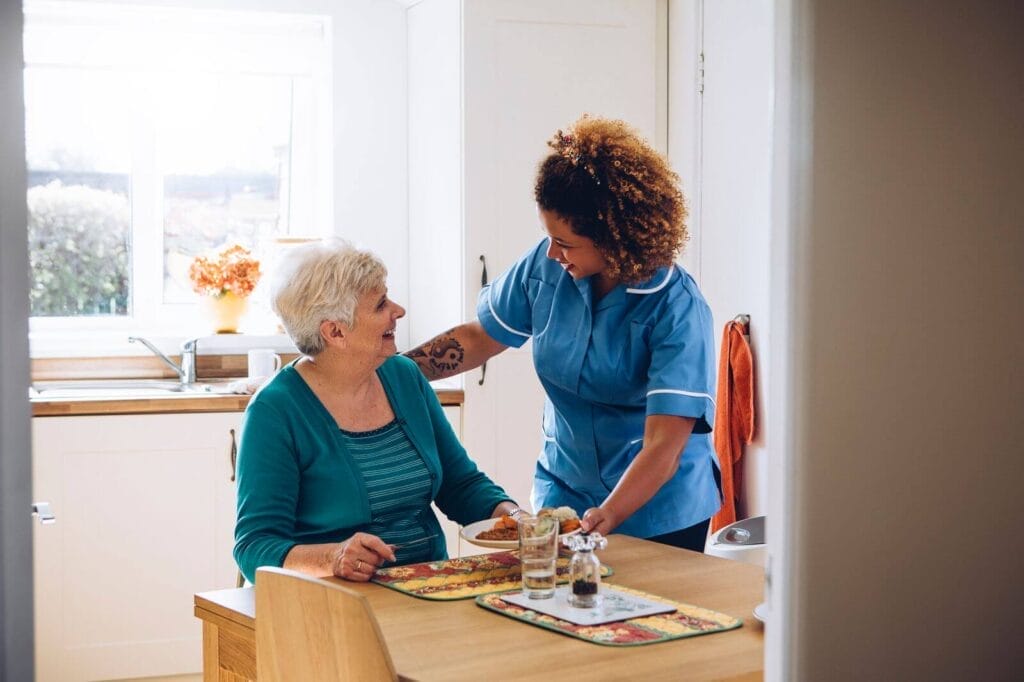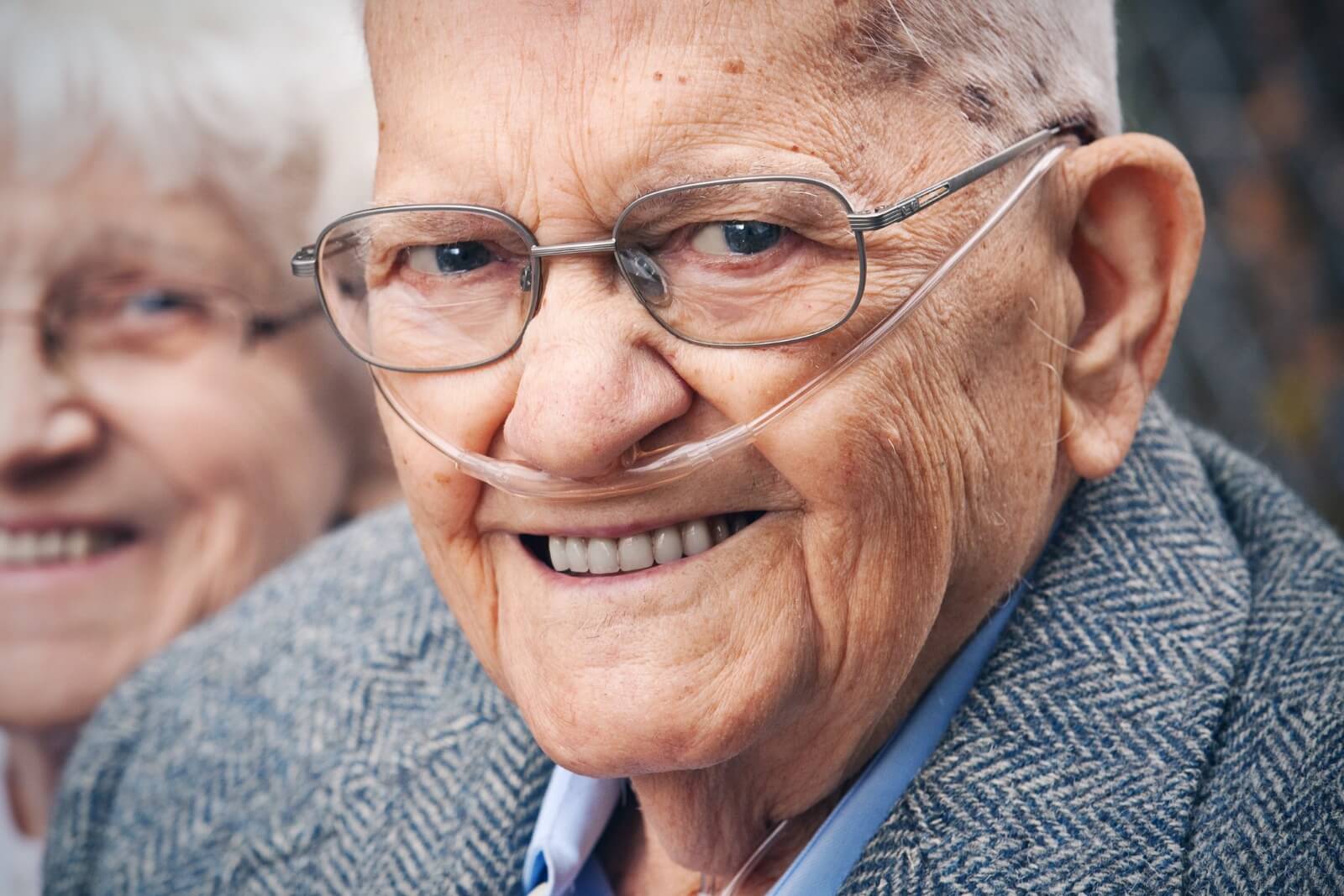
The majority of older adults want to live in their homes as long as possible while remaining safe and independent. More than 70% of adults want to do this, also called aging in place. While aging in place used to rely on seniors having a network of family caregivers nearby, today’s adults don’t need to call on family and friends to provide support. Home care agencies bring support and assistance into the home through personal care and homemaker services, making aging in place a realistic goal. Here, we’ll explain the differences in what you can expect from personal care and homemaker services so you can make the right choice for your home care needs.
What is in-home care?
In-home care is assistance brought into the home that supports older adults who want to age in place. There are two types of home care agencies: medical (home health) and nonmedical (home care).
Medical home health provides medical services administered by licensed clinicians, such as nurses or therapists. Common medical home health services include wound management, complex pain management, and physical, occupational, or speech therapy.
Nonmedical home care services are administered by caregivers rather than licensed clinicians. This nonmedical care includes transportation, companionship services, personal care, and homemaker services.
Personal care vs. homemaker services
Nonmedical home care is the best option for many seniors and their family members for their aging-in-place goals. Nonmedical services fill in the gaps that might exist due to decreased mobility, cognitive skills, or energy.
Two of the most common types of nonmedical home care services are personal care and homemaker services. While these two are similar in that they are both nonmedical and administered by caregivers, some key differences can help you determine which option might be best for your situation.
Be sure to clarify with the agency you are researching what type of tasks and assistance are included in the personal care and homemaker services they offer, as some agencies have varying definitions. However, here are a few general guidelines to help you decide which is best for you.
Personal care services
Most nonmedical home care agencies offer personal care services, which assist and support older adults with activities of daily living. These activities of daily living can include:
- •Dressing.
- •Grooming.
- •Bathing and/or showering.
- •Ambulation, or moving from one place to another in the home.
- •Eating, as in the actual process of eating, as opposed to grocery shopping or meal preparation.
- •Toileting or incontinence management.
Caregivers are trained to provide personalized support with personal care tasks based on the older adult’s needs and preferences. For someone more independent, this might mean verbally reminding the senior that it is time to get dressed for the day or that Tuesdays and Thursdays are shower days. For someone who requires more help, the caregiver might provide setup assistance, such as pulling out grooming supplies and putting toothpaste on the toothbrush, standing by to provide verbal cues as needed. For a senior who needs even more support, the caregiver might physically assist by helping them brush their teeth, shower, or get dressed.
Personal care task assistance is highly personalized. Caregivers follow a care plan, which details what type of support the senior needs with each activity of daily living. The care plan can change as the needs of the senior change. In most nonmedical home care agencies, the care plan is developed by a clinician or an experienced senior care advocate who assesses the needs of the senior and works with them to set care goals.
Who provides personal care assistance?
A caregiver provides personal care assistance in the senior’s home. This caregiver is not necessarily a certified nursing assistant (CNA), but depending on your state’s home care guidelines, they have been through some type of caregiver training.
How much does personal care assistance cost?
Nonmedical home care services, including personal care, typically cost an average of $26 per hour. Costs vary not only by state or region but also by home care agency. You might be able to find a discount if you book a certain number of hours per week or month with an agency, for example.
Who is an ideal candidate for personal care assistance?
Seniors who struggle with independently performing activities of daily living are ideal for personal care assistance. They might have limited mobility, pain, or decreased endurance, all of which can make regular activities of daily living difficult. Someone living with cognitive decline can also benefit from this type of assistance.
Homemaker services
Not all nonmedical home care services center on assisting with activities of daily living. Homemaker services help seniors care for their homes and organize their lives so that they meet personal wellness goals. Homemaker services can include:
- •Meal planning.
- •Shopping for groceries.
- •Meal preparation, including storing meals for future consumption.
- •Light housekeeping.
- •Laundry services.
- •Transportation to or from appointments or errands, including escorting the senior during these trips as needed.
- •Transportation to or from social gatherings.
- •Scheduling appointments and/or transportation services.
Who provides personal care assistance?
Caregivers perform homemaker services. These caregivers are not necessarily CNAs but have completed the caregiver training their state requires. A representative from the home care agency supervises the caregivers.
How much do homemaker services cost?
Nonmedical homemaker services typically cost similar rates to personal care. However, you might find that a nonmedical home care agency near you charges a bit less for homemaker services; it varies by agency. There are various ways to pay for homemaker services costs, including private funds, long-term care insurance (if you meet the requirement to utilize your policy), Medicaid waivers (for qualifying individuals), or Veterans benefits.
Who is an ideal candidate for homemaker services?
Seniors who can no longer drive and who do not have family support or community transportation assistance nearby can benefit from homemaker services. Others who might benefit include adults in the early stages of dementia who struggle with household chores or seniors who have never had to cook for just one person.
The right homemaker services can boost energy levels for the senior, as they no longer have to carry the mental and physical weight of certain household management tasks. Instead, they can use that time and energy on their personal care tasks, social calendar, and favorite activities or pastimes.
If you aren’t sure which home care option might be best for your loved one, begin by contacting a few nonmedical home care agencies in your area. Most offer free or reduced-rate consultations, and you can give more details about your situation so they can make a professional recommendation.








